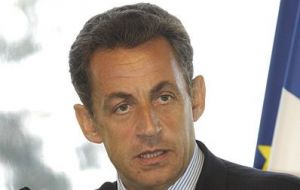MercoPress. South Atlantic News Agency
EU leaders reach a deal on Greek debt and boosting bailout fund to 1.4 trillion
 The decision the whole world was expecting, said Sarkozy
The decision the whole world was expecting, said Sarkozy European Union leaders announced an agreement early Thursday in Brussels on debt crisis measures including a hard-fought deal with private sector investors to write down Greek bonds by 50%.
The agreement came at the end of marathon talks to finalize details of a comprehensive policy response to the government debt crisis threatening the stability of the Euro currency and global economy.
French President Nicolas Sarkozy said Greek bondholders voluntarily agreed to write down the value of Greek bonds by 50%, which translates to 100 billion Euros and will reduce the nation's debt load to 120% from 150%.
“The result will relieve the whole world that was expecting a decision that was strong from the Euro zone,” French President Nicolas Sarkozy said at a press conference in Brussels.
Sarkozy said the leaders agreed to boost the firepower of the EU bailout fund, known as the European Financial Stability Facility, “by four or five fold.” He added that officials have negotiated additional funding from the International Monetary Fund.
The write-downs were one of three inter-related problems political leaders must solve to devise a comprehensive solution to Europe's debt crisis. They must also determine how to leverage a government-backed bailout fund and stabilize the banking sector.
European leaders persuaded bondholders to take 50% losses on Greek debt and boosted the firepower of the rescue fund to 1 trillion Euros, responding to global pressure to step up the fight against the financial crisis.
Ten hours of brinkmanship at the second crisis summit in four days delivered measures that the Euro area’s stewards said point the way out of the debt quagmire, even if key details are lacking.
Last-ditch talks with bank representatives led to the debt-relief accord, in an effort to quarantine Greece and prevent speculation against Italy and France from ravaging the Euro zone and wreaking global economic havoc.
“The world’s attention was on these talks today,” German Chancellor Angela Merkel told reporters in Brussels early Thursday. “We Europeans showed tonight that we reached the right conclusions.”
Measures include a bigger role for the International Monetary Fund, a commitment from Italy to do more to reduce its debt and a signal from leaders that the European Central Bank will maintain bond purchases in the secondary market.
Europe’s leaders took the unusual step of summoning the banks’ representative, Managing Director Charles Dallara of the Institute of International Finance, into the summit to break the deadlock over how to cut Greece’s debt to 120% of GDP by 2020.
Dallara squared off with a group led by German Chancellor Angela Merkel around midnight after issuing an e-mailed statement that “there is no agreement on any element of a deal.”
ECB President Jean-Claude Trichet, who has warned against the spillover effects of bond write-downs on the banking system, didn’t take part in the confrontation with Dallara.
Leaders backed two ways of leveraging up the 440 billion Euro rescue fund, which was designed last year to shield smaller countries such as Greece, Ireland and Portugal, and lacks the heft to protect Italy, the euro area’s third-largest economy.
While the mechanics have yet to be worked out, European Union President Herman Van Rompuy said the leverage effect would multiply the power of the fund by a factor of four to five.




Top Comments
Disclaimer & comment rulesCommenting for this story is now closed.
If you have a Facebook account, become a fan and comment on our Facebook Page!